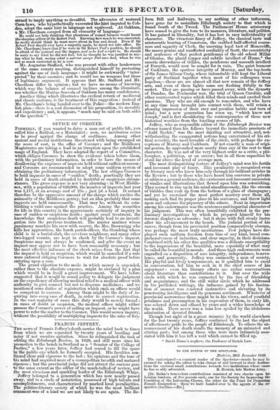OFFICE OF CORONER.
FORKERLY, if you wanted to drive a man out of public life, you called him a Radical, or a Materialist : now, no institution seems to be proof against the charge of costliness. Among other ancient and useful institutions threatened with being swamped on the score of cost, is the office of Coroner ; and the Middlesex 'Magistrates are taking a lead in an irruption upon the established usage of England. They have adopted the report of a Committee, which obliges Coroners to show the evidence taken before them, with the preliminary information in order to have the means of disallowing the expenses of inquests held without sufficient reason.; and Coroners are recommended to adopt some uniform system of obtaining the preliminary information. The law obliges Coroners to hold inquests in cases of " sudden " death; practically they are held in eases of death attended by doubtful or suspicious dream- stances. The gross expense is not very alarming • in West Middle- sex, with a population of 820,000, the number of inquests last year was 1,117, at an average cost of 23s.; just id. a head. It cannot therefore be the oppressive amount of the charge which excites the animosity of the Middlesex gentry, but an idea probably that some inquests are held unnecessarily. That may be without its esta- blishing. a valid case against the practice. Among the securities for life in this country is the approximate certainty of inquiry in case of sudden or suspicious death ; against cruel treatment, the knowledge that suspicious death will probably lead to an investi- gation into the previous treatment. The master mariner whose parsimony murders his crew with scurvy-, the Mrs. Brownrigg who • s her apprentices, the harsh parish-officer, the Standring whose child is in a burial-club, the covetous neighbour, and many other two-legged vermin, are kept in check by the doroner's inquest Suspicions may not always be confirmed, and after the event an inquest may appear not to have been reasonably necessary ; but the most effective influence of the check arises from the fact that the inquest is held on suspicion, which would be annulled if a rule were enforced obliging Coroners to wait for absolute proof before entering upon a case. The grand objection to the mode in which money is expended, rather than to the absolute expense, might be obviated by a plan which would be in itself a great improvement. We have before suggested that it would be sound policy to delegate the judgment on the expediency of allowing medical relief to a medical officer with authority to give counsel but not to dispense medicines ; and we mentioned some duties of registration which such an officer would be competent to execute. Among them might be the duty of in- quiring into every case of death, in order to correct registration. In the vast majority of cases this duty would be merely, formal ; in cases of doubt or suspicion the medical officer might either possess the Coroner's power of calling an inuest, or he might have power to refer the matter to the Coroner. This would secure inquiry, without the possibility of multiplying inquests for the sake of fees.


























 Previous page
Previous page